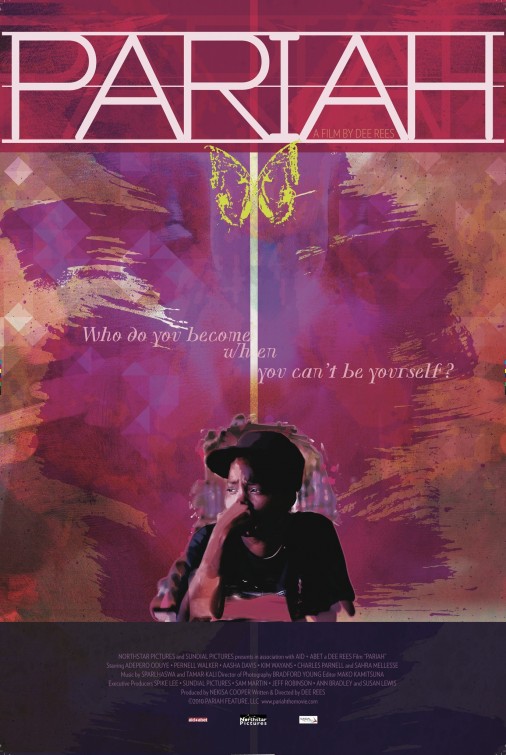Review of Pariah Directed by Dee Rees

Pariah, 2011, 1h 27m
Directed by Dee Rees
Reviewed by Iam Monroe
Studhood is something scarcely depicted in lesbian media, let alone depicted in media that explores the personal relationships of studs. Pariah is a true rarity in its portrayal of the turbulent, tender, and othering experiences and relationships that characterize coming of age as a young Black stud. While similar to butch identity, in regards to being a subculture of the broader lesbian community with a primary element of masculinity, stud identity differs by being exclusive to and influenced by Black American cultures.
The film follows Alike (Adepero Oduye), a shy, sensitive seventeen-year-old high school stud and aspiring poet living in Fort Greene, Brooklyn, with her mother (Kim Wayans), father (Charles Parnell), and younger sister (Sahra Mellesse). Alike is not out to her family, so she lives a “double life,” donning her desired masc get-ups outside of the house while remaining closeted at home. While Alike has a close friend and confidant in Laura (Pernell Walker), a fellow and more experienced Black stud, her mother disapproves of her company and forces Alike to begrudgingly befriend Bina (Aasha Davis), the daughter of her coworker, instead.
Despite their differences and initial reluctance, Alike falls hard for Bina. Their arranged meetups become enjoyable hangouts as they bond over similar alternative rock tastes. Alike forms the impression that what they have is real and mutual. But Bina, unlike Alike, still has hang-ups about her sexual orientation. “I’m not like, gay gay,” she says to her the morning after they spend the night together. Alike is crushed, and rightfully so. The first person she develops a genuine romantic and sexual connection with has easily shrugged off her feelings. Even when Alike visibly looks hurt, the only words Bina offers as comfort are, “You don’t have to tell anybody, okay?” More concerned with the possibility of sullying her reputation, she leaves Alike to bear the brewing storm of heartbreak alone. Granted, Bina is a young teenager who is still figuring things out, but so is Alike in her search for love and acceptance. Coming out is not easy for young Black girls, but in contrast to Bina, Alike has already decided that she wants to be true to herself. Soon after coming home, she comes out to her mother, solidifying her place in the world as a stud at the cost of losing her place in the family. Alike and Bina are in different stages of their journeys, which leads to their unfortunate end.
Pariah is a word meaning “a person without status,” “a rejected member of society,” or “an outcast.” Alike is made a pariah through the multiple facets of oppression she experiences as a Black masculine lesbian. The intersection of being Black, a woman, and a lesbian subjects her to mistreatment from her mother, followed by the eventual removal from her family, alienation from her community and peers, and the necessity to assimilate for survival. Laura, like Alike, is a pariah. Though much of her personal life isn’t explicitly explored, we know she is turned away from her household (presumably because of her sexuality), has dropped out of high school, and now lives with her sister, Candy, while working at a restaurant to pay the bills. Estrangement from families is not an uncommon reality for Black lesbians. Black families already carry generational trauma and a lack of generational wealth, so the traumatic violence of being removed from one's blood family only compounds those struggles. Even though Alike’s family is well off, her sexuality puts her at risk of losing support. Pariahs constantly face a harsher world.
In light of this reality, this movie profoundly shows the beautiful, mutual understanding between these two studs–these two pariahs. When Alike leaves home after being viciously attacked by her mother for coming out, it is Laura who saves her. Laura, who has gone through the same experience, is the one to comfort Alike and soothe her at her lowest. Laura cradles Alike’s head in her lap, one hand caressing her braids, the other downing a bottle of alcohol. Unlike Bina, she is the friend who sees, knows, feels, and understands Alike’s pain, even if they, too, have their differences. Alike’s peers note that she is not as typically “hard” as other studs, especially in comparison to Laura, but Laura loves and helps her all the same, and Alike’s expression, poetic aspirations, and sensitive nature do not make her any less of a stud. As Alike says when facing her mother, “There’s nothing wrong with me!”
Iam Monroe (they/them) is a writer, reader, digital artist, and Sinister Wisdom intern currently residing in Dallas–Fort Worth, Texas.
"Empowerment comes from ideas."
― Charlene Carruthers
"Your silence will not protect you."
— Tourmaline
"Gender is the poetry each of us makes out of the language we are taught."
— Leila Raven


